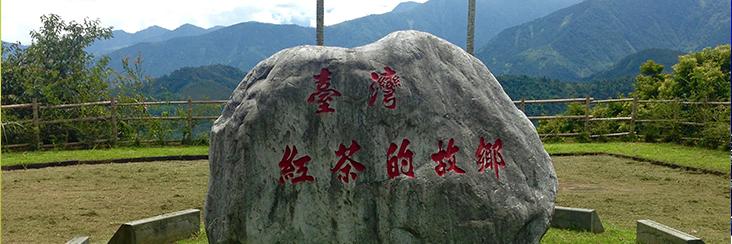
Preliminary Tea Judge Training In Taiwan
The Tea Research And Extension Station conducted tea judge training courses for three different Townships in Nantou County in the last month. While the first two were only minutes away from our sourcing director Andy's home in Zhushan, he was invited to northern Nantou to sit in on the course that was given at the TRES Yu Chi Branch located above Sun Moon Lake. Here is the view from the office building at the Tea Research Station.

The naturally occurring tea tree was cultivated in this area by early settlers in the Qing Dynasty, before the Japanese colonization of Taiwan that began in 1895. The Japanese developed Black Tea production in the area around Sun Moon Lake by importing the Assam tea strain from India, which in turn was both accidentally and then purposefully cross-bred with the indigenous strain. This was registered by the TRES in 1999 as Tai Cha #18, but is now commonly known as Red Jade or Ruby Tea. This strain was successfully promoted and its production has increased the quality and value of Taiwanese Black Tea greatly in the last decade or so. The Chinese characters in red on the granite stone below read "Taiwan: The Home Of Black Tea".

Thirty local residents within a given township are accepted into this course offered annually, where they attend four days of classes in preparation for the national exam at the Research Station's HQ in Yangmei, Taoyuan County. Passing this exam is prerequisite to attending advanced training courses in tea judging that are regional specific and focus on the competition standard for the tea type produced in that area. For example, to qualify as a preliminary tea judge for the Lugu Farmers' Association, graduates from this basic training must pass the much more rigorous course designed and conducted by the Lugu Farmers' Association. Andy's tea mentor Tony Lin has been mainly responsible for developing the Lugu F.A. judging course in conjunction with their Dong Ding Oolong Tea Competition — the world's largest and most prestigious Oolong competition.

In this course, participants must be able to discern among the eight most prominent tea types produced in Taiwan by identifying the dried tea leaves, the brewed tea leaves, and the brewed tea. The photo below shows the spectrum of teas from Green to Oolong to Black in succession for the students to study. They are as follows:
1. Bilochun Green 2. Baozhong Oolong 3. High Mountain Oolong 4. Dong Ding Oolong 5. Tieguanyin Oolong 6. Oriental Beauty Oolong 7. Small Leaf Type Black 8. Red Jade Black.
 After studying the tea types visually as well as by smelling the brewed leaves and tasting the tea, the class was given a practice test to identify the tea types by viewing and tasting the brewed tea only.
After studying the tea types visually as well as by smelling the brewed leaves and tasting the tea, the class was given a practice test to identify the tea types by viewing and tasting the brewed tea only.

This was followed by a practice test of discerning the tea types by tasting only using black tea bowls, which was actually easier than seeing the color of the brewed tea, as the proctors purposely filled the bowls to different levels among similar looking teas —making it more difficult to assess the color and visual consistency of the tea.

Finally, the students were asked to identify the tea types by assessing the dried and the brewed leaves only. They were also asked to match the dried leaf samples with the brewed leaf samples in this test. Andy was happy to find that he was 100% accurate in all the tea identification exercises, although it was a rather basic challenge, and he would have been a bit embarrassed to have scored anything less!

This was the final day of the four day course, where students prepared for the practical part of the exam of tea identification. The day before also involved practical training where students had to identify four basic flavor categories of sweet, sour, salty, and bitter. Not only were they tested to discern among these flavors, but they also were tested on gradations of one given flavor from weakest to strongest. This is meant to develop a more sensitive palate, where tea judges need to discern if there are impurities in the flavor of the tea.

Prior to the practical exam preparation, lectures were given on farm management, tea processing, and regional production trends that would all be included in the written exam. Andy felt privileged to have been invited by his friend Mr. Guo Kuang Fu — the director of the Yuchi branch of the TRES. He learned that this course is really a basic training for tea farmers to have a broader understanding of tea production in Taiwan overall, and to familiarize themselves with tea types outside of their own growing region. From here, they can decide to pursue further training in tea judging, or simply have a more educated understanding of Taiwan's tea industry. It was also a pleasure to simply spend some time at the Yuchi TRES Branch and enjoy this historical and scenic spot!


